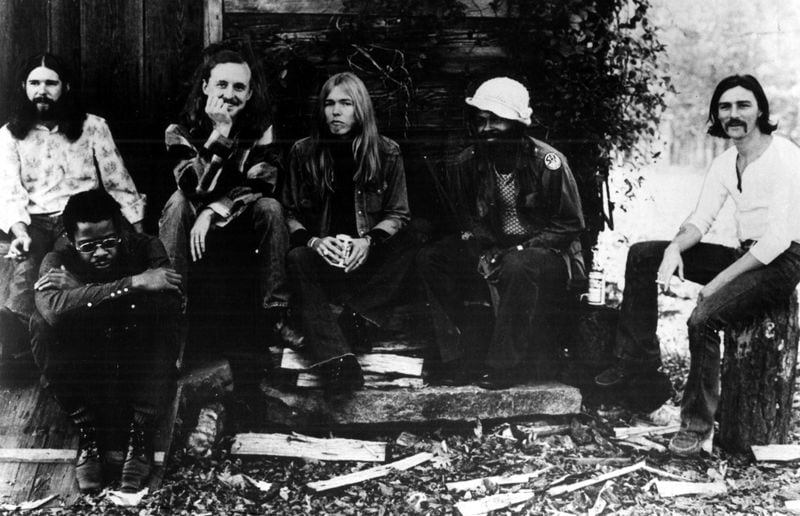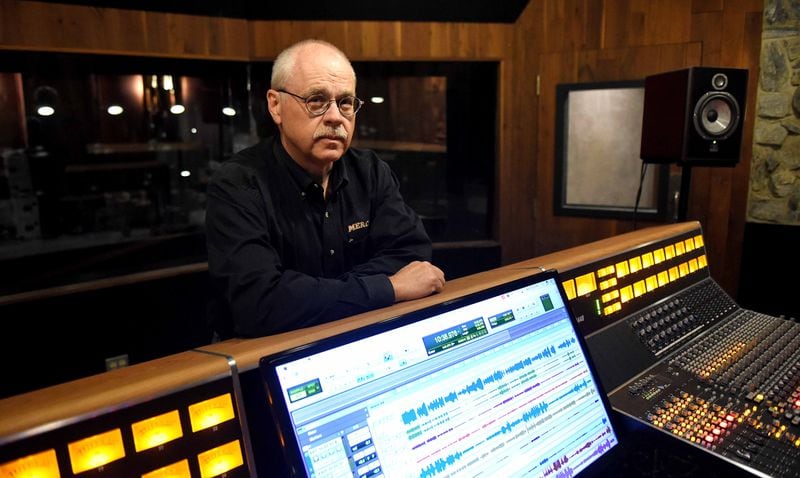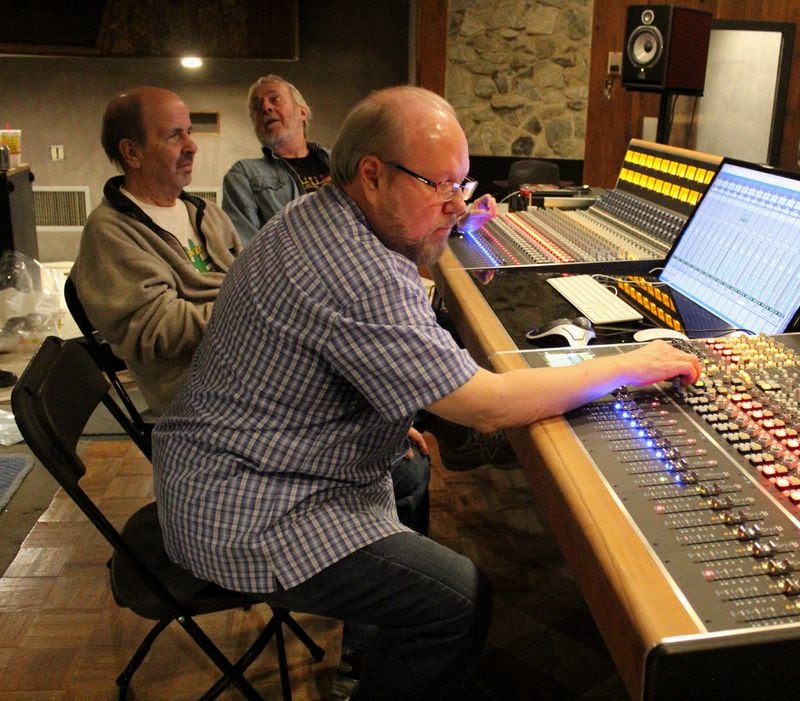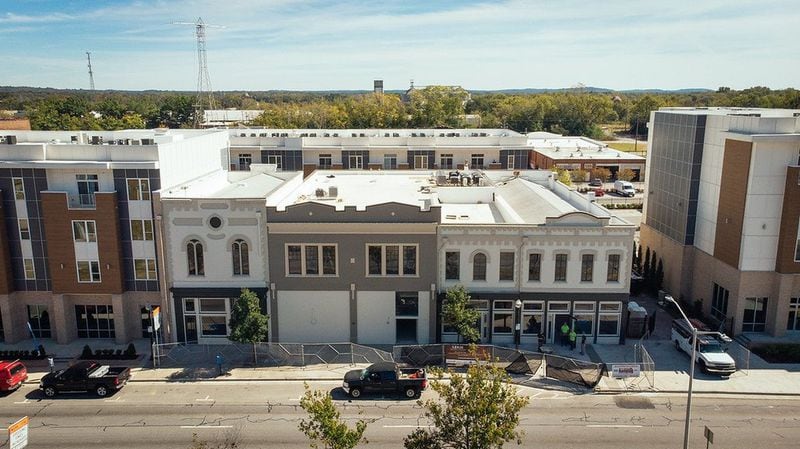In the spring of 2016, Gregg Allman stood on the grounds of Mercer University to receive an honorary doctorate of humanities degree, presented to him by former president Jimmy Carter and university president Bill Underwood.
Beforehand, he chatted with Underwood in the green room of Hawkins Arena on Mercer’s Macon campus about a beloved site at 540 Martin Luther King Jr. Blvd. — Capricorn Studios.
Perhaps recalling the dim room with its rust-colored soundproof walls and isolation booth covered in roof shingles, Allman gave Underwood some advice.
“Don’t change that room. It’s perfect,” he said. “And get an analog board.”
Three years later, with Allman buried less than 2 miles away at Rose Hill Cemetery, the mecca now named Mercer Music at Capricorn is readying its rebirth as a 20,000-square-foot complex owned by the university: two studios, a museum, offices and a 12-room "incubator" for musicians and students to utilize 24 hours a day.
The journey to the revitalization of Capricorn Studios has been, as these things tend to go, lengthy, exhausting and pricey — more than $5 million in total costs for the building and renovations.
The original studio was purchased in 1967 by the late Phil Walden — the impresario behind Capricorn Records and a Mercer alumnus — along with his brother Alan Walden and Otis Redding. Years ago, Redding and Walden conceived the idea of a studio where artists on their Capricorn label could record; but Redding’s untimely death in a December 1967 plane crash halted those plans.
Two years later, Walden, with guidance from mentor Jerry Wexler of Atlantic Records, joined with his brother Alan and legendary music executive Frank Fenter to open Capricorn Studios (the name chosen for Wexler and Phil Walden’s shared zodiac sign).
That was also the year that The Allman Brothers Band moved to Macon and quickly became the centerpiece of Capricorn, recording most of three albums there, as well as solo work from Gregg Allman (“Laid Back” in 1973) and Dickey Betts (“Highway Call” in 1974).
But after a decade of witnessing Allman and his bandmates craft such seminal work such as “Midnight Rider” and “Statesboro Blues,” as well recordings from a parade of artists, including The Marshall Tucker Band, Kitty Wells, Wet Willie and Dobie Gray, Capricorn Studios filed for bankruptcy and shuttered in 1979.
And then it languished, aside from a few spurts of business in the 1980s (as well, Walden’s Capricorn Records re-launched out of Nashville in 1990 with acts such as Widespread Panic and 311).
In 2010, the Georgia Trust for Historic Preservation assigned the building to its “Places in Peril” list (the 540 building was built in 1880), prompting The Peyton Anderson Foundation — the charity established by the late Macon newspaper publisher — to purchase the building out of foreclosure and stabilize it with a new roof. At the time, the historical site was about two years from collapsing.
“Peyton Anderson saved this building,” said Larry Brumley, senior vice president for marketing communications and chief of staff at Mercer University.
Credit: Ryon Horne
Credit: Ryon Horne
In December 2015, Mercer announced a commitment to restore the studio space through a combination of historic tax credits and fundraising, including a $2 million grant from The Peyton Anderson Foundation and the John S. and James L. Knight Foundation.
Underwood was determined to have Mercer Music at Capricorn completed by 2019 to commemorate the 50th anniversary of the studio.
It is — mostly — and will be publicly feted with festivities and live music on Dec. 2-3 before officially opening for business on Jan. 2.
And Allman’s recommendation for an analog recording board has been fulfilled.
The secrets inside
On a not-exactly-fall afternoon in Macon in early November, a trio of men who are deeply connected to Capricorn lore visited their old haunt, lured by an interest in seeing the new analog, 40-channel API 2448 recording console custom-built for the studio (API consoles were signature to the Capricorn sound), as well as the original iconic recording room.
Studio A, where all of those fabled recordings were made, has been left largely intact, save for the necessities of an upgraded electrical system and HVAC. The old curtains that hung along the back of the control room still exist. They were just sent to the cleaners for a much-needed refresh. And wood paneling revived a ‘70s vibe.
As Jim Hawkins walked the hallways back to Studio A, he paused and smiled.
“There was a Pepsi machine right there,” he said, pointing to a spot on a wall.
Inside the control room, Hawkins looked appreciatively at the new soundboard.
Of anyone in the room, his opinion carried the most heft. Hawkins was the original engineer at Capricorn Studios and also built its first console.
During his tenure at the studio from 1968-1971, Hawkins worked on hundreds of recordings, but when asked to share memories of sessions, he laughed.
“There aren’t any that I’d want to repeat,” he said.
But he did reminisce about working as an engineer with the Allman Brothers Band on their second album, “Idlewild South.”
“We cut ‘Midnight Rider,’ ‘In Memory of Elizabeth Reed,’ ‘Hoochie Coochie Man,’ and ‘Statesboro Blues.’ It wasn’t included on the record, but I’m pretty sure that recording of ‘Statesboro’ is the one that was finished out (on a deluxe version of the album),” Hawkins said.
Joining Hawkins in the studio were musician/producer Paul Hornsby, who played with Gregg and Duane Allman in Hour Glass and produced five Marshall Tucker Band albums among other bona fides during his tenure at Capricorn, and Ovie Sparks, who, in 1972, was named chief engineer at Capricorn Studios.
“It seems like yesterday,” Hornsby said as he leaned back in a chair behind the console.
Sparks later recalled a story about Wet Willie singer Jimmy Hall that utilized another part of the Capricorn building.
“Jimmy was sitting on the landing of the upstairs stairwell just outside the studio practicing his harmonica solo (for ‘Keep on Smilin’’). I went out to tell him we were ready to record his solo, and when I heard how wonderful he sounded in that stairwell, we decided to put a microphone out there with him and record his solo from right there,” Sparks said. “The natural reverb of the stairwell complemented the harp so well that we wanted to capture its ‘magic’ for the recording…As far as I know, no one else ever used the stairwell for a recording. That stairwell is still there today exactly as it was 46 years ago. So, who knows, maybe it will get used again someday.”
Close to the front of the 540 building resides the second, larger studio in the complex — Studio B — which is christened the Phil Walden Memorial Studio. A motorized screen will make it accessible for orchestral film scoring, and a nearby room fits enough people for an intimate concert.
In addition to the studios, an upstairs museum of about 1,200 square-feet will spotlight the history of all things Capricorn, with cases housing the label’s record covers, along with artifacts such as Walden’s address book, photos and memorabilia. A touchscreen panel will run the length of the floor — an idea inspired by a similar station at the Grammy Museum in Los Angeles — and explain historical tidbits, such as why Walden didn’t like the term “Southern rock.”
And, befitting the playful spirit of Capricorn Records, a mural of Wet Willie (the finger-in-the-ear visual pays homage to the, uh, Southern rock band) will greet visitors.
“The Capricorn story will be told in ‘things,’” Brumley said.
Cementing the musical future
While the history of Mercer Music at Capricorn is to be venerated, its future is what makes a music legend, such as Chuck Leavell, optimistic.
“What we hope is that we get young people,” the longtime keyboardist for The Rolling Stones and Allman Brothers Band said. “The hope is to bring new blood in there. Sure, if I have a project that comes up, (Capricorn) would be my first consideration. It’s an iconic studio, equally as much as Muscle Shoals or Fame Studios in Alabama or Criteria in Miami. In my mind, it’s up there with all of those.”
The ever-busy Leavell will lead the “Capricorn Revival” concert at 8 p.m. Dec. 3 at the Macon City Auditorium. The Randall Bramblett Band will serve as the house band, with performances from Widespread Panic’s John Bell, Taj Mahal, Charlie Starr of Blackberry Smoke, Brent Cobb, Bonnie Bramlett and others.
Leavell is also loaning his Hammond B3 organ, the same one that toured with him in his early band Sea Level and with The Rolling Stones.
Leavell’s instrument will be situated in the original Studio A, where on this day, Rob Evans, the chief engineer and studio manager, and Nashville producer Steve Ivey, fiddle with the API console and talk with Hawkins, Hornsby and Sparks about the technology in the room and how it will benefit both students and any other musicians who choose to record at Capricorn.
“The idea was to honor the past, the tradition. It was killing two birds with one stone to honor our history and get a board that any musician would love to record on,” Evans said. “We do have a strong campaign to get the word out that Capricorn is back. We plan to network with musicians and producers and have taken many trips to Nashville. There is a musical tourism that happens, too. People like to go to Fame or Stax (in Memphis), a name studio. This icon is back on the map, and that alone is reason to come here.”
Added Ivey, “We want to teach students how to record. I was a student at Mercer, and Paul (Hornsby) taught me how to record. We want to do the same thing. We can still bring in the old way of recording on analog, but we have the digital (component) and work with Pro Tools as well.”
In addition to the studio, both students and the public can access the “incubator,” the 12 rehearsal rooms — which can be used for storage rooms — and/or storage rooms can beare entered via a card, like a hotel room. Rates range from $250-$500 per month, depending upon the size of the room, or $100 per day.
The top floor of the incubator also pays homage to the building’s roots — Leavell, Alan Walden and Fenter all have rooms named for them — and a mural by Athens artist Michael Pierce enlivens the stairwell.
There is no doubt that the long-dormant block of buildings will soon be filled with music, which anyone associated with the project will view as a victory.
As Brumley posited, “This is about leveraging Macon’s music heritage to create Macon’s music future.”
Follow the AJC Music Scene on Facebook and Twitter.
More about Gregg Allman
CONCERT PREVIEW
Mercer Music at Capricorn celebrations
With Robert McDuffie Center for Strings, Otis Redding Foundation’s DREAM choir, Jimmy Hall and Friends, Robert Lee Coleman Band, Chris Hicks from the Marshall Tucker Band, Magnolia Moon and Caleb Melvin of Hindsight. 2 p.m.-6 p.m. Dec. 3. Free. Mercer Music at Capricorn studios, 540 Martin Luther King Jr. Blvd.
“Capricorn Revival” with Chuch Leavell, and the Bramblett Band, Wet Willie’s Hall, original Allman Brothers Band member Jaimoe, Taj Mahal and former Capricorn recording artists John Bell of Widespread Panic and Tommy Talton of Cowboy. Charlie Starr from Blackberry Smoke, Marcus King, Brent Cobb, and Duane Betts of the Allman Betts Band. 8 p.m. Dec. 3. $58-$128. Macon City Auditorium, 415 1st St., Macon. 1-800-745-3000, ticketmaster.com.
About the Author










